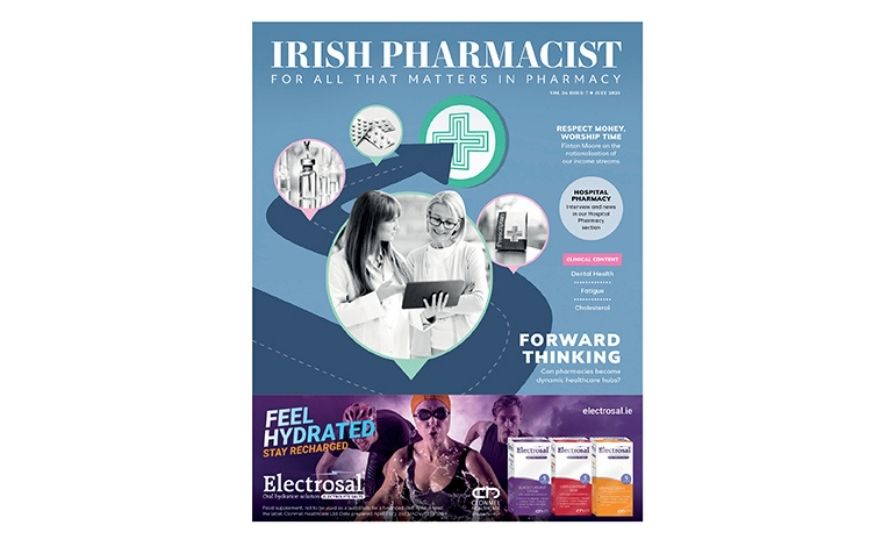Ultan Molloy explores the value of innovation, in fonts and in pharmacy
Colm O’Donnell from Sligo plays both flute and fiddle, and he reckons that when he composes tunes on the fiddle, they come out in a different way and are shaped in a way that would never present on the flute, if he were to try. Writer’s block hit me with the Times New Roman font, so here we go in Calibri, and we appear to be off to a blazing start [now converted to Utopia Std with all apologies! Ed].
These kind of little mental tricks are used in creative settings in order to shake one out of patterns of thinking and behaviour, and in order to drive innovation. ‘Innovation’, eh? Now, that’s always a great word to fire into any article. To innovate, meaning to do something new, or something differently, ie, in a new way. The word has been claimed, and proclaimed, on many an occasion where the words ‘new’ and ‘different’ would not have invited the same level of curiosity and engagement.
When it comes to pharmacy, I find it difficult to think of any significant innovations, certainly in community pharmacy, since I started in community practice over 20 years ago. Recalling the successful commercialisation of an idea, as another definition of an innovation, specifically in the community pharmacy sector, is a challenge for me, past price competition approaches, buying groups and symbol groups. There are no doubt a number of things that have escaped my attention that someone may wish to enlighten me on. However, it appears the essence of what is done on a day-to-day basis in community pharmacies hasn’t really developed much past routing prescriptions through a PMR via a number of staff, and handing back out labelled boxes, with a chat and some money changing hands in the process.
Electronic prescriptions could have taken another 10 years to get over the line, had we not have had the unfortunate gift of Covid. I read GPs congratulating themselves and one another on Twitter, and no doubt some of us pharmacists are also, on how they have embraced the technology so readily and successfully. If the ability to use an email function that is linked to your patient records is seen as worthy of such praise, I won’t be holding my breath for any further significant (unpaid) innovations in the near future. It isn’t just GP practices of course that aren’t fans of change, given that a number of pharmacies still manually claim, for example; it’s just human nature. What therefore needs to happen to deliver a compelling case for positive, patient-focused change in primary care, and then make it happen, in a robust and fit-for-purpose contract, and with a better-done rather than perfect approach?
GDPR regulations are still being quoted as a reason for not discussing patient medication with us in the pharmacy, when it suits in particular medical practices, although we’re expected to give out patient information over the phone on request to surgery and hospital staff. Really, how does that one work? Surely we’re all on the same team and want the best outcome for the patients. An open professional collaboration, on a foundation of trust and respect, then surely needs to be the starting point.
I recall there were objections to sharing the indication for prescribing particular items on prescriptions when there was talk of a new format GMS form some time back. How outrageous is it that a pharmacist might be privy to the indication of a particular medicine when dispensing it ‘safely and effectively’ to a patient? Go figure.
Professional value
With talks of a new contract no doubt ‘looming’ — continually looming — have we really come very far in the last 20 years in terms of demonstrating our value as a profession? Why not just give the medicines to the doctors and let them hand them out to the patients? No really, why? Because if it’s just a case of sticking medicines on boxes, and having the appropriate qualifications to do so, then there is no clear value-add there. And if there is no clear value-add, then why should the HSE/PCRS pay pharmacists well for the service?
“Not merely a conduit for drug delivery”, to quote a PSI document some time back. Well, who sees it that way? Not everyone, that’s for sure. It appears that ‘the job’ in community pharmacy has become extremely complex, just to get the right medicine to the patient in a timely fashion, and to get costs covered without undue administration or unnecessary rework. Stock management, supply chain issues, invoicing and accounts, HR, pricing, IT/EPOS systems, claims and reclaims, PCRS/HSE administration requirements, clinical oversight and prescription review, CPD, SOPs and regulatory requirements, OTC supervision, being available to patients and others, extended services, safe and accurate dispensing, and much more.
All, in no particular order, are just part of a pharmacist’s day’s work. I’m reminded that a priority, singular, is something that is regarded as more important than the others — so what is the priority please?
It is somewhat embarrassing when I think back on what little perspective and understanding I had, and how much I had to learn…
With medicine shortages more recently continually causing rework havoc, ‘just another step in the dispensing process’ was also introduced in recent months. Like we need another step to absorb our finite attention ability, which could be otherwise directed toward the application of clinical knowledge, toward building a trusted, communicative relationship with the patients, and all primary care stakeholders. The story of Warren Beatty incorrectly announcing La-La Land as the winning film at the Oscars comes to mind here when it comes to increasing complexity. It was the presence of a second (to be sure, to be sure) set of envelopes that caused the error that their presence was supposed to prevent. It can’t be more, and more, and more, and then expecting something not to fall through the cracks.
Soul-searching
I’ve done some soul-searching of late and have come to the conclusion that I’m not down on GPs. Nor do I have a chip on my shoulder. If anything, I’m frustrated at much of my experience of pharmacy over the years. Communication, respect, trust, a shared patient focus, collaborative prescribing and all that good stuff I thought awaited on the far side of my degree didn’t shape-up the way I thought they would. I didn’t cover myself in glory either in terms of my approach and self-awareness on many an occasion, but I was most certainly sold a ‘pig in a poke’.
I’m not down on locum pharmacists either, as it happens. An unfortunate, frustrated comment I made to a post suggesting the idea of a fixed minimum rate for locum pharmacists was misinterpreted to suggest the same. I locumed for several years when I returned to Ireland after travelling in the noughties, and charged employers well for what was often solely my physical presence, when my mind was elsewhere. It is somewhat embarrassing when I think back on what little perspective and understanding I had, and how much I had to learn, now seeing the situation as an employer. In my 20s, I felt entitled to, and could in fairness command, a ridiculous hourly rate, given the shortage of pharmacist locums on the scene, the county where I was living, and my willingness to travel. Supply and demand and all that, along with the attitude and ego I brought with me.
Presently, as an employer, I find it difficult to reconcile those rates that appear to be expected for occasional locum cover in an environment where wage inflation and staffing requirements in non-pharmacist roles have increased in recent years. Where turnover is down 17 per cent for us from its peak a few years back following on from medicine price cuts, and when pharmacies have lost on average over €100k off their bottom line.
Luckily, we have a great supportive and committed team in place, and as I write this, I am remembering to be very thankful for that. At the same time, I am not entitled to have them working with us, and I am not the easiest person to work for. I’m probably more anxious than your ‘average bear’ about the future of community pharmacy, and perhaps more emotionally labile than the aforementioned bear also! I know, however, that my expectations of the team are clearly understood by them, and we have an understanding that works. We have a positive and collaborative work environment and that works well for those who spend their time in it.
I care about our team, as I care about our customers and patients, and look to build our relationships on a foundation of respect, trust and a shared humanity. I have a responsibility to deliver on my obligations to them, as they have to their colleagues, our customers and to me as their employer. I want us to care for our patients, as we look to care for one another, with kindness and compassion, accepting that we won’t get it right all of the time. I’ve just re-read that last line. Of course, the prescriptions will be right all the time. If this ever starts to become an issue, sure, we can just add another step in the dispensing process.
Anyway, so I’ve just been called up for a CPD portfolio review. I knew it was coming. I’m feeling rusty when it comes to medicine and treatment innovations in recent years, so it’s a good opportunity to revisit some of what I’d learned some time back, and need a refresh on. Maybe I’ll get the opportunity to apply a greater percentage of what I learn this time around. Perhaps more about that next time. For now, I hope you’re keeping yourself and your loved ones safe and well, in an environment where our diligence appears to have loosened somewhat. Further challenges no doubt await us.
We will get through them together, and likely realise that things were neither as good or as bad as we thought they were at the time.








